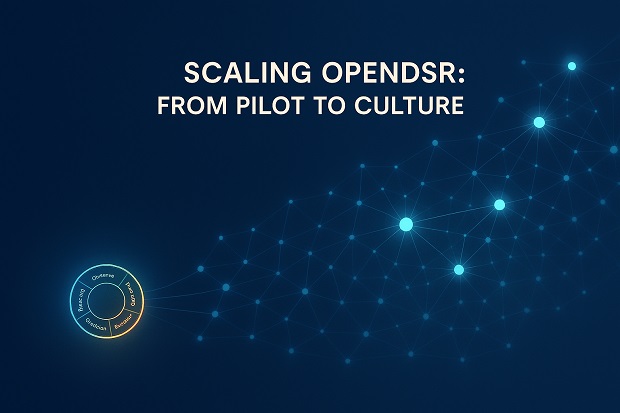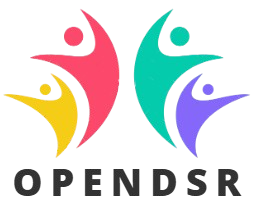
Scaling OPENDSR: From One Team to the Whole Enterprise
: The Challenge of Scale
Every transformation starts small.
A single HR project.
A motivated team.
A manager who believes in better ways of working.
But the moment it starts showing results, one question echoes across the boardroom:
“How do we scale this?”
Scaling experience is not like scaling software. You can’t copy-paste empathy, duplicate trust, or replicate human rhythm overnight.
Yet, without scale, even the best EX initiatives remain isolated—powerful but limited.
That’s why OPENDSR was designed with scalability built in.
It transforms employee experience from a program into a system—a rhythm that expands naturally from one team to an entire organization.
The Reality of Scaling Employee Experience
Most employee experience (EX) efforts begin with enthusiasm—and stall with exhaustion.
Common barriers include:
- Inconsistency: Different teams interpret EX differently.
- Ownership gaps: HR leads the initiative, but managers don’t embed it.
- Data silos: Insights from pilots never connect to enterprise systems.
- Change fatigue: Employees see new programs but not lasting change.
The result: islands of innovation, oceans of inertia.
Scaling OPENDSR means building connection between islands—turning experiments into an integrated ecosystem of experience.
Why OPENDSR Scales Differently
Unlike typical EX models or one-time transformation programs, OPENDSR—Operating Principles for Empathy-led Navigation, Design Standards, and Real-Time Intelligence—is modular, systemic, and repeatable.
It can begin with one team, one process, or one problem, and grow steadily without breaking rhythm.
What makes it scale-ready?
- Standardized yet flexible 7-step framework.
- Role-based ownership model (HR, Managers, EX Stewards).
- Built-in real-time feedback loops.
- Technology-agnostic design (works on Teams, SharePoint, Slack, etc.).
- Focus on rhythm, not rollout.
The OPENDSR Scaling Blueprint
Stage
Goal
Description
Pilot
Validate concept
Test OPENDSR cycle with 1–2 teams. Capture impact and stories.
Localize
Customize rhythm
Adapt standards to department culture and tools.
Systemize
Build governance
Define ownership roles, data dashboards, and cadence.
Integrate
Connect systems
Link EX dashboards with HR, IT, and operations data.
Scale
Expand reach
Roll out across business units with internal champions.
Refine
Sustain rhythm
Continuous learning and quarterly reviews.
Step 1: Start Small – The Power of Pilots
Every transformation begins with proof.
The pilot phase of OPENDSR focuses on a single team, project, or department.
Choose an area that’s:
- Emotionally visible (e.g., onboarding, recognition, feedback loops).
- Measurable within 60–90 days.
- Open to co-creation and learning.
Goal: Validate that OPENDSR’s 7-step cycle improves trust, engagement, and workflow.
Example:
A 50-member customer support team used OPENDSR to redesign shift feedback and recognition. Within 8 weeks, morale rose by 30% and customer satisfaction by 18%. That data became the case for scale.
“Start small enough to learn fast, but visible enough to inspire.”
Step 2: Localize – Adapt to Each Culture
What works for one team might not fit another.
The Localize phase ensures OPENDSR resonates across different business units, geographies, or roles.
Localization involves:
- Adjusting tone and tools (factory floor vs remote office).
- Translating rituals into cultural context.
- Ensuring inclusivity in communication and recognition.
- Aligning EX goals with local KPIs.
Example:
In a retail organization, OPENDSR pilots in stores emphasized “daily energy.”
In corporate HQ, the focus shifted to “collaboration clarity.”
Same framework. Different flavor. Consistent rhythm.
Step 3: Systemize – Establish Governance and Roles
Scaling requires ownership clarity.
In this phase, organizations set up the EX Governance Model—the backbone of scale.
Core Roles in Scaled OPENDSR:
Role
Function
EX Steward
Manages the OPENDSR cycle locally and closes feedback loops.
Design Owner
Ensures inclusive and consistent standards.
Data Curator
Monitors real-time dashboards and trends.
Sponsor
Senior leader championing the EX rhythm.
Governance meetings happen quarterly, reviewing friction, trust, and flow metrics.
This light yet disciplined structure keeps empathy operational, not ornamental.
Step 4: Integrate – Connect Systems for Scale
Scaling fails when EX data lives in silos.
In this phase, OPENDSR connects insights across HR, IT, Operations, and Communication systems—forming a single source of experience truth.
Integration Blueprint:
- HRIS / ATS: employee lifecycle data.
- CorporateOne (SharePoint EX Platform): experience dashboards, recognition boards, friction logs.
- Teams / Slack / Viva Engage: pulse feedback and recognition bots.
- Power BI / Analytics: real-time visualization of sentiment and EX health.
Integration transforms scattered initiatives into one Experience Operating System.
Step 5: Scale – Build Champions, Not Copies
Scaling isn’t about replication—it’s about amplification.
OPENDSR expands through champions, not commands.
Organizations identify and empower:
- EX Ambassadors: local advocates sharing wins.
- Manager Multipliers: trained leaders modeling empathy rituals.
- Cross-Functional Circles: shared learning forums.
Each new circle learns the rhythm, applies it, shares results, and inspires the next.
Example:
A global manufacturer started with 2 pilot factories. Within 9 months, 10 plants adopted OPENDSR rituals—each customizing weekly feedback huddles. Engagement grew 35%, and lost-time injury rates dropped 15%.
“Scaling experience means scaling belief.”
Step 6: Refine – Sustain Through Continuous Learning
The final stage isn’t “completion”—it’s continuity.
OPENDSR scales sustainably because it bakes refinement into rhythm.
Quarterly EX reviews become natural checkpoints:
- What friction reduced?
- What trust improved?
- What needs redesign?
The refinement journal acts as institutional memory—ensuring no insight is lost, and every team contributes to evolving the system.
When refinement is routine, scaling becomes self-sustaining.
Case Study: Scaling OPENDSR in a Global Tech Company
Challenge:
The company had strong pilot results in 3 departments but struggled to connect the dots across 12 countries.
Approach:
- Pilot: Started with engineering teams.
- Localize: Translated rituals for support and sales.
- Systemize: Created 4-role governance model.
- Integrate: Linked feedback from Teams to Power BI dashboard.
- Scale: Trained 50 EX champions across regions.
- Refine: Quarterly “EX Sprint Reviews.”
Results after 1 year:
- Engagement ↑ 32%.
- Manager empathy score ↑ 28%.
- Global trust index ↑ 24 points.
- EX dashboards embedded across departments.
- Pilots evolved into permanent Experience Governance Council.
Voices from the Field
“OPENDSR gave us structure for something we used to treat as intuition.”
— HR Director, Manufacturing
“It’s rare to find a framework that scales human emotion.”
— VP, People & Culture
“Our managers now talk about ‘friction points’ the same way they talk about performance metrics.”
— EX Lead, Technology Firm
Measurable Outcomes of Scaling OPENDSR
Metric
Pilot Stage
Enterprise Scale
% Improvement
Engagement Response Rate
60%
90%
+30%
Attrition Rate
18%
12%
–33%
Manager Empathy Score
65
83
+28%
Trust Index
70
94
+34%
Cross-Team Collaboration
Moderate
High
+45%
EX ROI (Employee Experience Return)
Pilot-level
Sustained enterprise rhythm
Measurable & ongoing
Scaling isn’t just about more participation—it’s about sustained performance.
Why Scaling OPENDSR Works (When Others Don’t)
Most EX programs collapse at scale because they treat experience as a campaign.
OPENDSR treats it as a system of behavior anchored in:
- Empathy: Listening before acting.
- Design: Structure that sustains consistency.
- Intelligence: Data that drives refinement.
- Ownership: Shared roles that keep it human.
- Rhythm: Predictable, repeatable cycles.
This is why OPENDSR doesn’t “roll out”—it grows.
Integrating OPENDSR into Enterprise Systems
Once scale begins, technology becomes the backbone.
OPENDSR integrates seamlessly with enterprise ecosystems:
- CorporateOne (SharePoint-based EX platform): the experience hub for dashboards, feedback, and recognition.
- Microsoft Teams / Viva Engage: live EX signals, pulse check-ins, and manager alerts.
- Power BI: centralized reporting and analytics for EX health.
- HRMS & IT Tools: lifecycle data integration for automation and insights.
Together, they form a Connected EX Infrastructure—a single rhythm across people, systems, and culture.
The Future of Scaling: From Programs to Ecosystems
Scaling OPENDSR is not about more dashboards—it’s about more depth.
As organizations mature:
- HR evolves into EX Governance Partner.
- Managers become culture multipliers.
- Employees become experience designers.
- Culture becomes a live operating system.
“You don’t roll out OPENDSR—you grow into it.”
The future of scale is not expansion—it’s evolution.
When OPENDSR becomes part of how people think, work, and reflect, experience scales itself.








